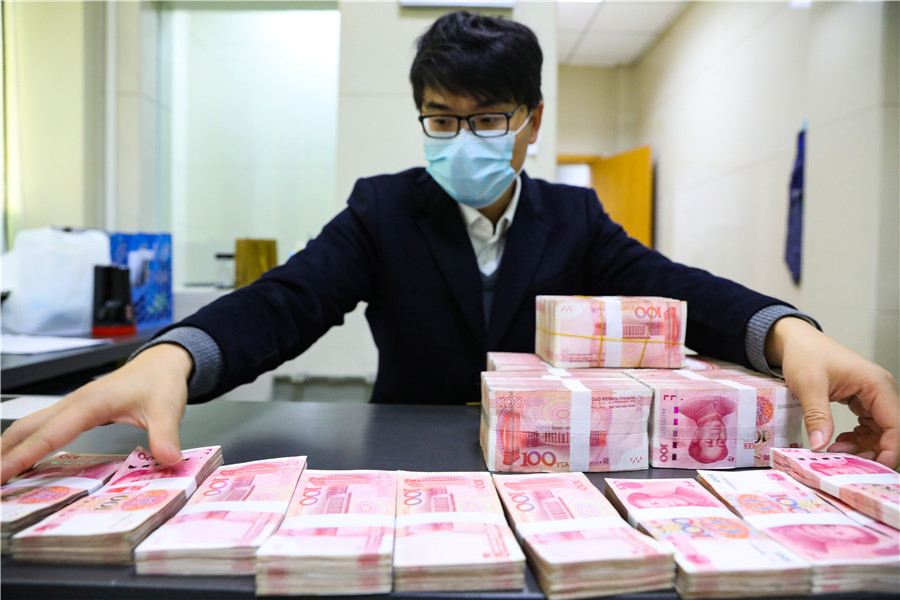Monetary authorities stress stable prices, financial stability


Chinese monetary authorities stressed stabilizing prices and maintaining financial stability over the weekend, vowing to take measures to prevent potential risks in property financing, cross-border capital flows and the bond market.
The central bank, the People's Bank of China, will improve the so-called macro-prudential policy framework, which requires building a full-range financial risk monitoring and warning system, especially to supervise activities of adding leverage, debt, and financial cycles, PBOC Vice-Governor Li Bo said at a forum on Saturday.
Another senior PBOC official posted a statement on Sunday, saying the yuan exchange rate has remained generally stable at a reasonable equilibrium so far this year.
Liu Guoqiang, also a vice-governor of the central bank, said that in the future, the RMB exchange rate will float depending on the market supply-demand relationship and changes in global financial markets. The "two-way floats" will be a normal phenomenon.
The current exchange rate regime is suitable for China, at present and in the future, Liu said.
Macro-prudential policy is not a new concept for central bankers. It became popular when the world reviewed the 2008 global financial crises, recognizing that risk prevention should focus not only on single financial institution or single sector, but also on systemic risks. And macro-prudential policy is such a solution that is able to address systemic risks, according to experts.
The PBOC is planning to establish targeted policy tools and include influential financial activities, financial institutions, financial markets and related infrastructures must be placed into the macro-prudential management system. Foreign exchange rate policy is also involved in the framework.
The central bank will further optimize the financial regulatory framework, consider further clarifying and separating the prudential supervision function and behavior supervision function of regulatory authorities, PBOC Vice-Governor Li said at the forum held by Tsinghua University PBC School of Finance.
To identify the targets and responsibilities of prudent regulation is also a key part of China's financial regulatory reform in the next step, said Li.
Richard Apostolik, president and CEO of the Global Association of Risk Professionals said that China has made risk management a priority for the financial services industry and the country. "It's been very clear about this priority."
"Recognizing the importance of risk management at the most senior levels of the government embeds it into the country's corporate psyche, from the most junior to the most senior levels in an organization, and will help reduce or avoiding negative outcomes while building a solid foundation for rapid and continued growth," Apostolik added.
China's Cabinet-level financial regulatory body held a meeting on Friday, called to maintain prudent monetary policy and make it flexible and appropriate to better serve the real economy.
Credit policy, in the meantime, should be targeted and match the needs of market entities, while maintaining adequate and reasonable liquidity, the Financial Stability and Development Committee under the State Council said in a meeting statement.
The meeting was chaired by Vice-Premier Liu He, who is also head of the regulatory committee. The statement highlighted preventing financial risks, especially in promoting reforms in medium and small financial institutions to reduce credit risk. The regulation on financial activities of platform enterprises should be strengthened.
The meeting statement also contained a vow to crack down on bitcoin mining and trading, and prevent individual risk to spread to society.
The financial regulatory body also warned of shocks from overseas, asking to deal with imported inflation and enhance expectation management with well-prepared policies, according to the statement.
Zhang Xiaohui, former assistant to the Chinese central bank governor and dean of the PBC School of Finance, said China should pay attention to the changes in monetary policy in developing countries, which may result in short-term impacts on the domestic financial system.
"We should closely watch the inflation of global asset prices, and the related over-leverage, as well as financial instability," Zhang said, adding that to prepare for different inflation scenarios, especially to properly manage expectations. Overheated investment in some areas caused by rising structural inflation could be another risk, she said.




































